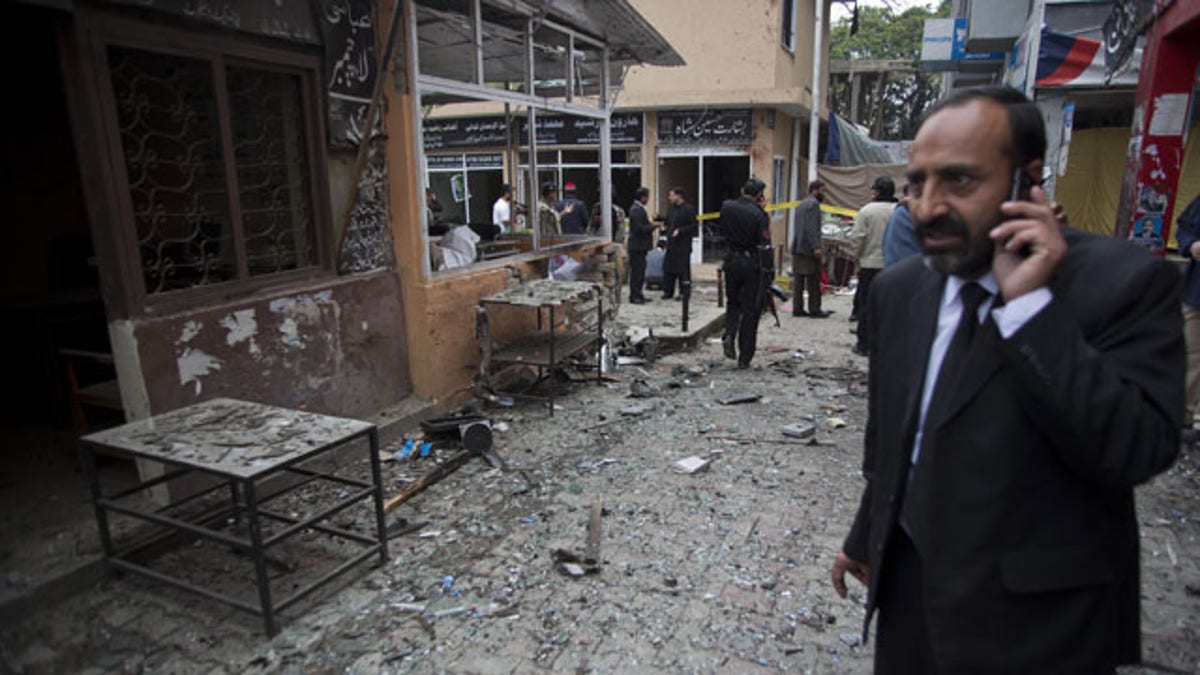
March 3, 2014: A Pakistani lawyer talks on his mobile phone at the site of a suicide attack in a court complex in Islamabad, Pakistan. Two suicide bombers blew themselves up at the complex on Monday, killing 11 people and wounding dozens in a rare terror attack in the heart of Islamabad, officials said. (AP Photo/B.K. Bangash)
ISLAMABAD – A group of armed men, including two suicide attackers, stormed a court complex in the Pakistani capital on Monday in a rare terror attack in the heart of Islamabad that killed 11 people and wounded dozens.
There were conflicting reports on how many attackers were involved in the incident. Initial reports suggested two men wearing explosive vests rushed into the court complex, threw hand grenades and started shooting, then blew themselves up, said Islamabad Police Chief Sikander Hayat.
He put the death toll at 11 as did another police official and a hospital spokeswoman where the dead were taken.
"It was certainly an act of terrorism," Hayat said in televised comments to reporters.
One of the attackers blew himself up outside the office of the lawyers' union president and the other outside the door of a judge's office, said Hayat.
The explosions sent lawyers and judges running in fear for their lives as police stormed in. Hayat said police subsequently searched the entire complex and found no additional attackers.
Other officials and a lawyer on the scene said there were more than two attackers. Police official Jamil Hashmi said there were about six to eight attackers who spread into different areas of the court complex.
"One of the attackers entered a courtroom and shot and killed a judge," Hashmi said. "We are searching whether there are any other attackers or some wounded people needing help."
Lawyer Murad Ali said he saw several attackers walking toward a courtroom, brandishing weapons.
"They had automatic weapons. They had hand grenades," he said. "I saw them shooting a female lawyer."
His hands were splattered in blood that he said came from helping remove four dead bodies.
The dead included two judges and five lawyers, said Dr. Altaf at the Pakistan Institute of Medical Sciences in Islamabad where the dead and wounded were taken. Altaf, who spoke to television reporters and only gave his family name, said most of the victims had bullet wounds. He said 25 were wounded, five of them critically.
The area where the attack occurred is a warren of walkways filled with judges' chambers, lawyers' offices and restaurants and businesses catering to the legal community. The walkways are filled with copying machines for clerks and clients to make copies of legal documents, and prisoners wearing chains can often be seen walking through the complex on their way to and from court. Families of suspects on trial also often stand around the area, waiting for their loved ones to appear in court.
Pakistani television showed images of the area with windows blown out, walls torn and lawyers wearing the traditional black suit worn by all Pakistani lawyers carrying what appeared to be dead and wounded from the buildings. Policemen with weapons raised ran through the area and searched offices.
Body parts and blood were spread over a stretch outside the courtrooms and attorney's offices. The police cordoned off the complex, which was taken over by the commandos from the police anti-terrorist force.
There was no immediate claim of responsibility for the attack, which came as a shock to a city that has enjoyed a respite from the frequent bombings and shootings prevalent in other Pakistani cities like Peshawar near the tribal areas or the port city of Karachi.
The attack is sure to complicate government efforts to negotiate a peace settlement with militants in the country's northwest who have waged a bloody war against the government for years.
The Pakistani Taliban said Saturday they would implement a one-month ceasefire in an effort to revive a foundering peace process.
A spokesman for the militant organization said in a telephone call to an Associated Press reporter that the group was not involved in the Islamabad attack and restated his group's commitment to the ceasefire.
But Monday's deadly attack highlights the difficulty in negotiating a peace deal with a multi-faceted group like the Pakistani Taliban, made up of varying factions. Analysts say that while some in the group may want to negotiate a peace deal, other factions may not, making it difficult to enforce a peace deal across all the factions. The cease-fire did not include other groups, such as Al Qaeda, that operate in Pakistan.
